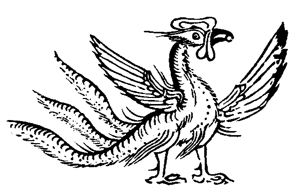
The Turning of Heaven
by Chuang Tzu
“It's not surprising you felt that way,” said the emperor. “I performed it through man, tuned it to Heaven, went forward with ritual principle, and established it in Great Purity. Perfect music must first respond to the needs of man, accord with the reason of Heaven, proceed by the Five Virtues, and blend with spontaneity; only then can it bring order to the four seasons and bestow a final harmony upon the ten thousand things. Then the four seasons will rise one after the other, the ten thousands things will take their turn at living. Now flourishing, now decaying, the civil and military strains will keep them in step; now with clear notes, now with dull ones, the yin and yang will blend all in harmony, the sounds flowing forth like light, like hibernating insects that start to wriggle again, like the crash of thunder with which I awe the world. At the end, no tail; at the beginning, no head; now dead, now alive, now flat on the ground, now up on its feet, its constancy is unending, yet there is nothing that can be counted on. That's why you felt afraid.
“Then I played it with the harmony of yin and yang, lit it with the shining of sun and moon; its notes I was able to make long or short, yielding or strong, modulating about a single unity, but bowing before no rule or constancy. In the valley they filled they valley; in the void they filled the void; plugging up the crevices, holding back the spirit, accepting things on their own terms. Its notes were clear and radiant, its fame high and bright. Therefore the ghosts and spirits kept to their darkness and the sun, moon, stars, and constellations marched in their orbits. I made it stop where there is an end to things, made it flow where there is no stopping. You try to fathom it but can't understand, try to gaze at it but can't see, try to overtake it but can't catch up. You stand dazed before the four-directioned emptiness of the Way, or lean on your desk and moan. Your eyes fail before you can see, your strength knuckles under before you can catch up. It was nothing I could do anything about. Your body melted into the empty void, and this brought you to an idle freedom. It was this idle freedom that made you feel weary.
“Then I played it with unwearying notes and tuned it to the command of spontaneity. Therefore there seemed to be a chaos where things grow in thickets together, a maturity where nothing takes form, a universal plucking where nothing gets pulled, a clouded obscurity where there is no sound. It moved in no direction at all, rested in mysterious shadow. Some called it death. Some called it life, some called it fruit, some called it flower. It flowed and scattered, and bowed before no constant tone. The world, perplexed by it, went to the sage for instruction, for the sage is the comprehender of true form and the completer of fate. When the Heavenly mechanism is not put into action and yet the five vital organs are all complete - this may be called the music of Heaven. Wordless, it delights the mind. Therefore the lord of Yen sang its praises thus: 'Listen - you do not hear its sound; look - you do not see its form. It fills all Heaven and earth, enwraps all of the six directions.' You wanted to hear it but had no way to go about it. That was why you felt confused.
“Music begins with fear, and because of this fear there is dread, as of a curse. Then I add the weariness, and because of the weariness there is compliance. I end it all with the confusion and because of the confusion there is stupidity. And because of the stupidity there is the Way, the Way that can be lifted up and carried around wherever you go.”